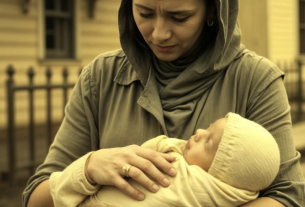— “Are you trying to give Mom a heart attack on purpose?” Nikolai flared up, tossing the TV remote onto the table like it was a grenade.
— “Don’t be dramatic,” Elena replied wearily, not pausing from washing the dishes. “Let her at least stop rummaging through my cupboards first.”
— “She wants what’s best for you!” Nikolai pushed into the kitchen, leaning in with his whole body. “She says you’ve got everything in a mess, like some college girl. You’re a grown woman—you have a husband, a family. And you live like… like you’re seventeen, not thirty-five!”
— “Because it’s my apartment, Kolya. And if I want to keep the tea in the bottom drawer instead of the top one, then that’s what I’ll do. Understand?”
He sighed. Long and theatrically pained. Rubbed his forehead.
— “There it is again. Everything is ‘my,’ ‘my.’ Do you even realize you live with other people?”
— “I do. Very much so. Especially when someone barges into the bathroom while I’m showering because ‘the faucet is leaking’ on their end. I notice when random jars of sauerkraut appear in my fridge. And when somebody touches my documents in the drawer. Oh, I notice, Kolya.”
She turned off the water and slowly wiped her hands on the towel. Turned around.
— “Tell me honestly. Was making the apartment over to you your idea?”
He pressed his lips together. Stayed silent.
— “Mom said it was ‘in the interest of the family.’ So everything would be proper. So that, God forbid, if something happens to me—the apartment doesn’t go who-knows-where.”
— “Who-knows-where?” Elena snorted. “I’ve got no brothers or sisters. It’s already mine by will. And even if I fall from the ninth floor tomorrow—it still belongs to me. Not to your mother, Kolya. Sorry.”
— “Mom is suggesting normal things. She’s an elder, she worries. She…”
— “She’s up to her eyeballs in debt, Kolya. I’ve figured that out already.”
Silence. Long.
Nikolai seemed to freeze. He jerked away from the table, braced his hands on the windowsill, and stared out at the May evening chill that was ruffling the leaves in the wind.
— “What are you talking about…”
— “You didn’t know? Or you pretended not to?” Elena crossed her arms over her chest. “The bailiffs came. There was a letter in the mailbox. Your mother even took out some microloan in your name. On paper—you’re the guarantor. She tried to pull it off quietly, dump it all on you. And now that she miscalculated—she wants the apartment. To sell it. Or use it as collateral. My apartment—as collateral! For her ‘treatment,’ ‘renovation,’ and ‘debt obligation,’ as she put it. Very legal-sounding.”
Nikolai stood there like he’d been struck on the back of the head. His shoulders slumped.
— “She said it was just helping the family…”
— “The family? This is her fourth attempt to save her credit score, Kolya. Remember 2021—there was ‘helping the family’ then, too, when she bought an electric scooter on credit and put it in your name. And you paid it off for two years.”
— “I thought she had changed…”
— “She did. For the worse. She’s become even craftier. Her words are sugar laced with poison. Sweet, cloying tone—up until you sign something. And then that’s it, Kolya—you’re the debtor. And I’m out on the street.”
He turned slowly. His eyes had gone a heavy gray.
— “But you can’t just… refuse her. She’s my mother…”
— “And you can’t just betray me,” Elena cut him off. “Otherwise this isn’t a marriage. It’s a deal. And I have no chance in it.”
She went into the living room. It smelled faintly of new laminate flooring—barely perceptible, but like in a cheap hotel where nothing feels real. A place you only stay if you need a bed for the night. The apartment she’d carefully put together after her grandmother’s death was becoming less and less “hers” with every new attempt by Margarita Vasilievna.
Elena sat on the couch, picked up the remote, and turned on the TV. Some cooking competition crackled, but she didn’t care. She wasn’t watching.
— “Did you really think I… that I’d agree to this?” she heard Nikolai’s voice behind her.
— “I was hoping till the end that you were an adult,” Elena said tiredly, without turning. “And not a mama’s boy.”
He slammed a cabinet door.
— “That’s enough! You have no right to insult me. You don’t know what it’s like to be between two fires! On one side you—with your complaints; on the other—her, with debts!”
— “Oh, I know. I’m the third fire, Kolya. In this little play of yours, you were planning to burn me up. Without a safety net.”
— “Elena…”
— “Leave.”
— “What?”
— “Leave. For the night. Go to your mother’s. Think about where you want to live. With me—in my apartment. Or with her—in a rental. That’s all. I have nothing more to say to you.”
She stood and walked past him as if he were furniture. He remained standing in the doorway. Awkward. At a loss. With someone else’s shoes in the background of his reflection in the mirror.
And the door closed behind him softly. As if the apartment itself said, “No. Don’t come in anymore.”
— “Open up, Elena. I know you’re home. Your bathroom light is on.”
Margarita Vasilievna pounded on the door with her palm—heavy, insistent, like a bailiff with an attitude. The sound of her sharp heels echoed up and down the stairwell.
— “I didn’t give birth to a son for you to boss him around. And this apartment—it should be registered to the husband! To the head of the family!”
— “Go home, Margarita Vasilievna,” Elena said through the closed door, surprisingly calm. “Nikolai and I have discussed everything. This is my apartment, and there will be no more discussion.”
— “Oh, there won’t?!” Margarita yanked the handle, but it held. “Kolya will be here any minute—and the three of us will decide who discusses what around here! Don’t flatter yourself—you’re no mistress of the house! The mistress isn’t the one with a paper for the apartment, but the one with experience and common sense!”
— “And you have debts,” Elena threw back. “I know everything.”
Silence. Beyond the door.
And then… a blow. Right against the door.
Elena flinched. The hit wasn’t strong, just demonstrative. As if Margarita wanted the wood to remember who was in charge here.
— “Here’s how it’s going to be,” came the now hoarse voice. “You’re not the boss of me. You’re just… a girl who got lucky. By chance. The apartment isn’t your achievement. And believe me, you’ll be thanking us if we help you keep it. Because if I tell him how you behave—Kolya himself will throw you out on the street. And believe me, he can. Oh yes, he can. Because a husband is a pillar, not a piece of furniture in your bedroom.”
The door jerked again, but this time it was Margarita who faltered.
— “Leave, Margarita Vasilievna,” Elena said coldly. “Or I’ll call the police. Next time—no warning.”
Another twenty seconds passed.
Then—the fading click of heels. And a scent—faint but suffocating: a mix of harsh perfume and mothballs. The kind elementary-school teachers used to wear, only meaner.
Two hours later, Nikolai came back. With a Pyaterochka bag, as if nothing had happened. As if he’d just popped out for kefir and got delayed.
— “So you called Mom after all?” Elena said tiredly from the couch.
— “She came on her own. I was at her place—she was crying. Says you were rude, you threw her out, you yelled. You…”
— “Don’t lie,” Elena said sharply. “I didn’t yell. She barged in here like a market fishwife, with her fists. She pounded on the door. Is that what you want? For her to run this place?”
— “She’s desperate. Debt collectors are outside her window!”
— “Then let her pay up! What do I have to do with it? This is my grandmother’s apartment. My memory. My only one. She comes here with her debt, and you sing backup for her!”
— “I can’t just abandon her, Lena! Do you understand? I’m her son. Do you want me to choose between you?”
— “Yes. I do. Because she already chose. She chose money. And who will you choose?”
He said nothing. Then… he tossed the bag onto the table. The plastic split; a loaf of bread and a crumpled box of tea slid out. He stepped toward Elena. Abruptly.
— “I’m tired. I’m just tired. You always have complaints. Mom—she’s an old woman. Her blood pressure is high. And you—you act like a stranger! You don’t even talk to her like she’s a human being! You…”
— “I talk to her as what she is. A manipulator. A predator. And you’re her prey. And I’m an obstacle.”
— “Who do you think you are to decide?!” Nikolai grabbed her hand and squeezed hard. “Have you forgotten you’re married? That you’re supposed to consider more than just your own opinion?”
— “Let go,” Elena said evenly.
— “You drove my mother to tears!”
— “And she drove me to the notary, Kolya. I was at the notary today. Redid everything. The will, the directive. If anything happens to me—the apartment goes to a charity foundation for women who have survived domestic violence.”
He turned pale.
— “You wouldn’t dare…”
— “Already did. Let her know that if she keeps playing, she’ll lose everything. Even the chance to ‘grab a piece.’”
He stepped back. Slowly. As if someone had shackled him from the inside.
— “You… you’re sick…”
— “No. I got well. From naivety. Starting today—everything is different. I am not obliged to be a victim just because your mother is ‘high society.’ Though her house is shabby and her perfume is from Magnit.”
She walked past him into the bathroom. Closed the door. Slid the latch. He didn’t even move. Stood there in the kitchen among the spilled tea and the softened loaf, like he’d gotten in line for morals and forgotten why he’d come.
And behind the door it was quiet. Like a room where no one will ever share a bed again.
“Divorce is not a tragedy. The tragedy is living with you.”
— “So you’re serious, huh?” Nikolai sat on the edge of the couch, hunched as if he’d suddenly turned ninety-five. “A foundation? Violence? Is that about me now, Lena?”
— “About us,” Elena said calmly, drying the dishes. “Violence isn’t only a fist to the face. It’s when you endure pressure day after day, guilt, anxiety. When it’s hard to breathe in your own home. That’s violence, too. And yes, I want my apartment to help women—not those who drive them under your mother’s veil.”
— “I just don’t understand,” Nikolai stood and stared out the window. “I’m not a bad person. I just… don’t want my mother to die with debts.”
— “Then sell your car. Or give up your share of your parents’ house. Why is my apartment the solution to her crisis?”
He didn’t answer.
The next day, Margarita Vasilievna tried to come into the apartment again. But now there was a new sign on the door:
“Unauthorized entry is prohibited. Any violation of private property will be recorded by the video surveillance system.”
And the camera—cheap, from Citilink—but it worked. The blinking diode scared everyone, even the mailman.
Margarita fumed, but she no longer battered the door; instead she called Nikolai. Fourteen times a day. Saying:
— “Are you completely under her thumb, son? Or did that… that ‘volunteer’ knock the sense out of you?”
— “She’s not a volunteer, Mom. She’s my wife.”
— “Not anymore,” Elena hissed, standing behind him. “I filed. Yesterday.”
He recoiled. Margarita fell silent. Then exhaled softly and venomously:
— “Bravo. You’re good at destroying families. Clap, clap. Go ahead now with your camera and sue me—like all these modern girls. Complainers.”
— “Better a complainer than your slave,” Elena shot back. “And yes—I will file. For emotional damages. For the break-ins. For threats. For drilling into your son’s head that a woman is a debtor by definition.”
— “Do you realize I’m alone now?” Margarita suddenly said, off script. “Everything is collapsing for me. I have nothing left.”
— “Not you,” Elena replied evenly. “Me. But now I’m rebuilding it. My life. My dignity. Myself.”
Two weeks passed.
Elena sat on the windowsill in her apartment. She looked out at the spring street where the wind chased a plastic bag with the Magnit logo. Like an omen.
A folder of papers lay on her knees: the divorce filing, a copy of the new will, receipts for the lawyer.
She didn’t cry. Not anymore. She’d cried earlier—in the bathroom, in the kitchen, when Nikolai called and asked her to “think it over once more.” Now—emptiness. But it was a good emptiness. Like a clean sheet of paper. Or a room where they’ve finally hauled out the old Soviet wall unit and let the air play.
Her phone rang. A message on the screen from the lawyer:
“The hearing is set for May 15. All documents accepted. Good luck to you, Elena Sergeevna.”
She smiled. She really wouldn’t mind some luck. But the main thing was—this was her path now. Without other people’s voices in her head. Without manipulation. Without fear.
The doorbell rang.
She stood up. Walked over. Looked through the peephole.
A young woman, in a baseball cap and holding a tablet.
— “Hello. We’re conducting a survey among neighborhood residents. Would you like to take part in a support program for women after divorce?”
Elena opened the door.
— “You know what? I won’t just take part. I want to join the project’s advisory board. I have experience. Bitter. But honest.”
The woman nodded, and Elena walked back inside without looking back, as if she were coming home… only this time for real.
Epilogue
A couple of months later, Elena heard her former mother-in-law’s surname again. On TV. A segment on the local channel: a pensioner owed a large sum to the bank; neighbors complained about fights and scandals. The camera showed a woman in a housecoat with a loud voice, threatening the cameraman with a broom.
— “I recognize you, Margarita Vasilievna,” Elena said quietly, turning off the TV.
Then she took out the kettle. Measured out good green tea—not from Pyaterochka, but from a little shop next to the notary’s office. And sat on the windowsill. In the silence. No calls. No tears. No one else’s decisions.
She simply lived.



